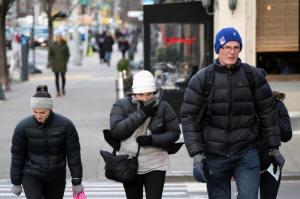|
Dangerous cold, snow forecast for parts
of northern United States
 Send a link to a friend
Send a link to a friend
 [December 17, 2016]
(Reuters) - The arctic air that has
chilled large swaths of the northern United States for days will
culminate this weekend with dangerous cold in Montana and North Dakota
as heavy snow falls in other parts of the country, officials said. [December 17, 2016]
(Reuters) - The arctic air that has
chilled large swaths of the northern United States for days will
culminate this weekend with dangerous cold in Montana and North Dakota
as heavy snow falls in other parts of the country, officials said.
People in North Dakota face "life threatening cold" and the risk of
frostbite with exposure of 10 minutes or less, the National Weather
Service (NWS) said in an advisory.
In Montana dangerous wind chills are expected to last through Saturday
afternoon and people should guard against hypothermia, the NWS said.
Temperatures in parts of Montana could plummet to record lows for this
day of around minus 30 degrees Fahrenheit (minus 34 degrees Celsius),
meteorologist Kenneth James of the Weather Prediction Center said in a
phone interview.
The bitter cold comes from a blast of arctic air - the second one this
week - blowing south from Canada across the U.S. border into the
northern plain states and the Midwest, NWS officials said.

It has joined forces with a storm that swept in from the Pacific Ocean,
bringing snowfall to large sections of the northern United States as it
chugs across the country to the East Coast, they said.
Areas of Wisconsin, Indiana, Vermont, New Hampshire and Maine will see
the heaviest snowfall from the storm on Saturday, with up to 6 inches
(15 cm) of accumulation possible in those regions, James said.
And the extreme weather could snarl traffic in several parts of the
country this weekend, from north-central Montana where the NWS warned of
the possibility of drifting snow on roads to Philadelphia where the
forecast calls for icy rain.
[to top of second column] |

People brave the cold weather in East Village in New York City, NY,
U.S. December 15, 2016. REUTERS/Alex Wroblewski

Americans living in areas affected by the cold weather have some
relief on the way.
"It really begins petering out by about Monday morning," James said.
How cold has it been?
Boston, which shivered in the arctic air after it blew in from the
Midwest, on Friday experienced the coldest temperatures for that day
since 1883, according to the NWS. School were closed and officials
warned residents to cover up or stay indoors.
(Reporting by Alex Dobuzinskis in Los Angeles; editing by Jason
Neely)
[© 2016 Thomson Reuters. All rights
reserved.]
Copyright 2016 Reuters. All rights reserved. This material may not be published,
broadcast, rewritten or redistributed.
 |